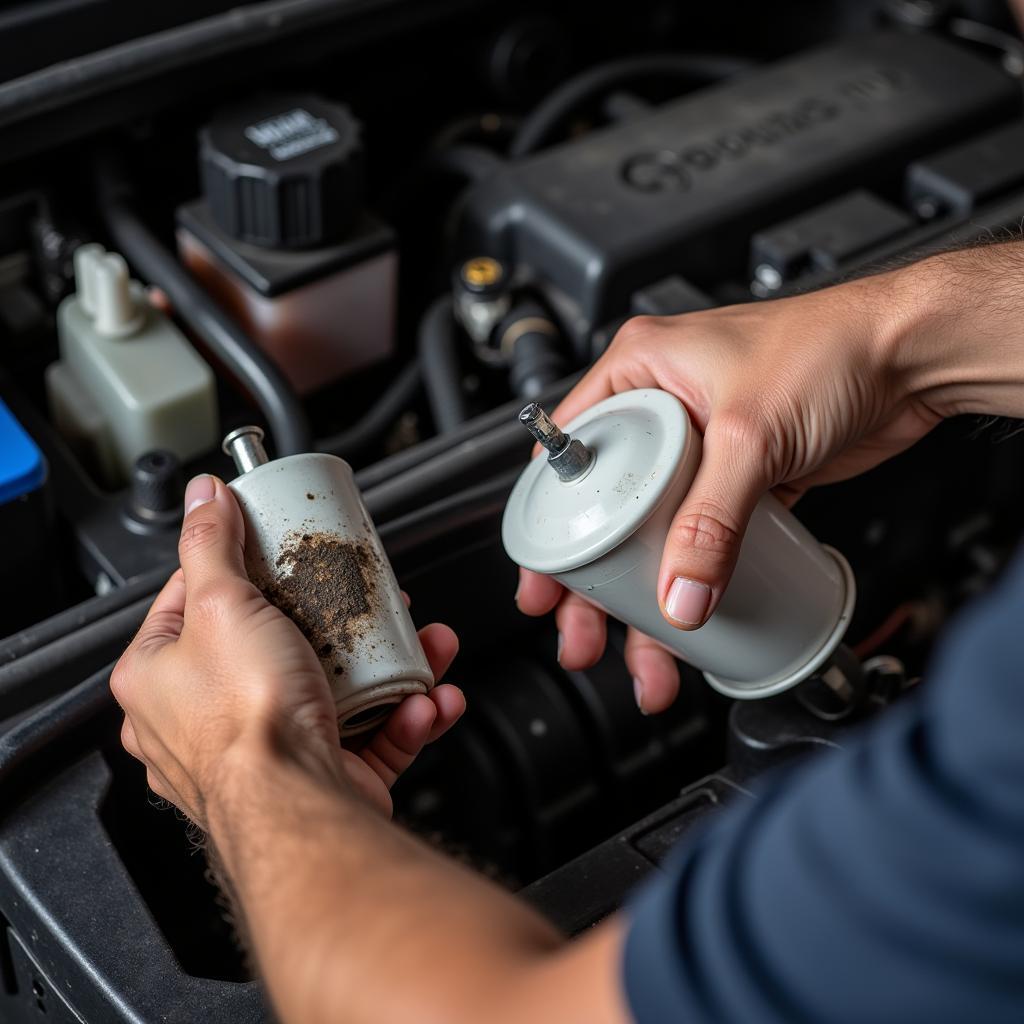Experiencing trouble starting your car after filling up the tank? This frustrating issue can stem from a variety of causes, ranging from simple fixes to more complex problems. This guide will explore the common reasons why your car might have a Problem Starting Car After Fueling, offer troubleshooting steps, and provide solutions to get you back on the road. We’ll cover everything from faulty fuel pumps to vapor lock, offering expert advice and practical tips.
If you’ve ever experienced a 2006 A3 car starting problem after fueling, you know how annoying it can be. This problem isn’t exclusive to older Audis though, it can happen to any make and model. Let’s delve into some of the potential culprits.
Understanding Why Your Car Won’t Start After Fueling
Several factors can contribute to a car struggling to start after refueling. Understanding these potential causes can help you pinpoint the issue and find a solution quickly. One common culprit is a flooded engine, which can occur if too much fuel enters the cylinders. This can happen if the fuel injectors malfunction or if the fuel pressure regulator is faulty. Another possible cause is a vapor lock, which happens when fuel vaporizes in the fuel lines, disrupting the flow of fuel to the engine. This is more common in hot weather. Additionally, a faulty fuel pump, a clogged fuel filter, or even a loose gas cap can all contribute to starting problems. If you’re wondering if different fuel can cause car problems, the answer is yes. Using the wrong type of fuel can damage your engine and lead to starting issues.
Another less common issue, particularly relevant to owners of flood-damaged cars, is electrical system damage. If your car has a history of water damage, common problems with a flood damaged car can manifest as starting issues after refueling, due to corrosion and short circuits in sensitive components.
Troubleshooting a Car That Won’t Start After Fueling
First, try the simplest solution: check your gas cap. Ensure it’s securely tightened. A loose or damaged gas cap can disrupt the fuel system’s pressure, making it difficult for the engine to start. If the gas cap isn’t the issue, try turning the key to the “on” position (without starting the engine) for a few seconds, then back to “off.” Repeat this a few times. This can help reset the fuel system and clear any potential vapor lock. If your car still won’t start, check your fuel gauge. While it might seem obvious, a faulty fuel gauge might not accurately reflect your fuel level. You might have run out of gas unknowingly, especially if you recently had issues with your fuel system.
When to Seek Professional Help
If these basic troubleshooting steps don’t work, it’s time to seek professional help. A qualified mechanic can diagnose the problem accurately and recommend the appropriate repairs. They might check for more complex issues like a malfunctioning fuel pump relay, a faulty evaporative emissions control system, or even a problem with the car’s computer. For example, if you’re experiencing Audi car problems and solutions are proving elusive, a specialized Audi technician is your best bet.
Don’t hesitate to seek professional assistance if you suspect a more serious issue. Ignoring the problem could lead to further damage and more costly repairs down the line.
Preventing Future Starting Problems
Regular maintenance is key to preventing starting problems after fueling. Make sure to replace your fuel filter according to your car’s maintenance schedule. This helps prevent clogs and ensures proper fuel flow. You might also consider using a fuel system cleaner periodically to remove deposits and keep your fuel system in optimal condition. Finally, be mindful of the fuel you use. Always use the correct octane rating recommended by your car’s manufacturer. If you’re a muscle car enthusiast and facing muscle car problems, ensuring the correct fuel is even more critical.
 Fuel Filter Replacement
Fuel Filter Replacement
Conclusion
Experiencing a problem starting car after fueling can be frustrating, but by understanding the potential causes and following the troubleshooting steps outlined in this guide, you can often resolve the issue quickly. Remember, regular maintenance is crucial for preventing future starting problems. If the problem persists, don’t hesitate to contact a qualified mechanic for assistance.
Need help with your car? Connect with AutoTipPro for expert advice and reliable service.
Contact us at: +1 (641) 206-8880
Our office: 500 N St Mary’s St, San Antonio, TX 78205, United States
FAQ
-
Why does my car sometimes hesitate to start after filling up? This could be due to a variety of reasons, including a vapor lock, a loose gas cap, or a flooded engine.
-
Is it bad to top off your gas tank? Yes, it can damage the evaporative emissions system.
-
Can a bad fuel pump cause starting problems after fueling? Yes, a weak or failing fuel pump can struggle to deliver fuel after the tank is full, leading to starting issues.
-
How often should I replace my fuel filter? Consult your car’s owner’s manual for the recommended replacement interval.
-
Could using the wrong type of fuel cause starting problems? Absolutely, using the incorrect octane fuel can negatively impact engine performance and cause starting difficulties.
-
Should I worry if my car only has trouble starting after fueling occasionally? While intermittent issues can be tricky to diagnose, it’s still worth having it checked by a mechanic to prevent potential problems.
-
What should I do if my car smells strongly of gasoline after fueling? This could indicate a leak in the fuel system. Do not start the car and contact a mechanic immediately.






Leave a Reply